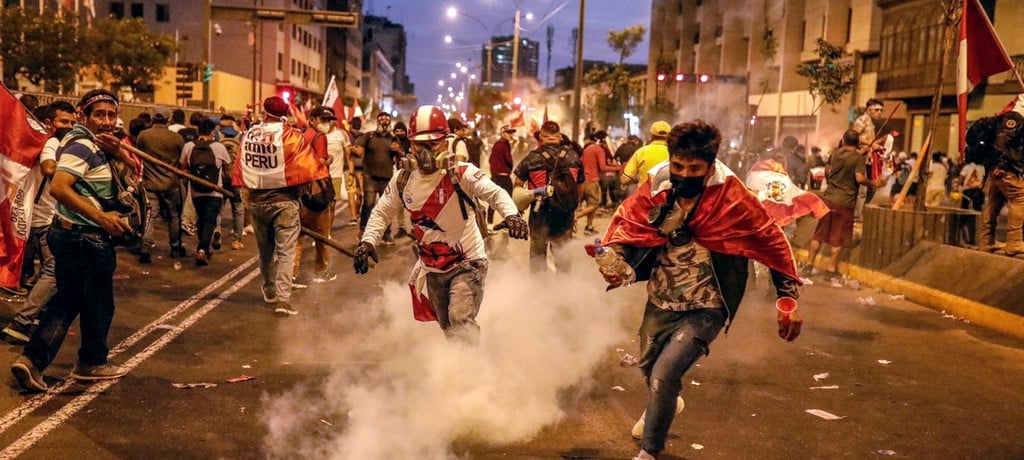
Peruvians stay mobilized. Photo: Aldair Mejia/EPA.

Orinoco Tribune – News and opinion pieces about Venezuela and beyond
From Venezuela and made by Venezuelan Chavistas

Peruvians stay mobilized. Photo: Aldair Mejia/EPA.
By Ángel Guerra Cabrera – Jan 25, 2023
Regarding the vigorous Peruvian rebellion, I believe it is essential to underline the decisive role of the peoples and their political and social struggles in the gestation and advancement of progressive governments. In the same way, this progress was indispensable in generating a network of regional and sub-regional organizations, among them CELAC, which sought the unity and integration of Latin America and the Caribbean. The emergence of Hugo Chávez, the first cycle of progressive governments, and the aforementioned network during the transition from the 20th to the 21st century had much to do with the Caracazo and, in general, a cycle of strong Latin American and Caribbean popular resistance against neoliberal policies. Through multiform popular mobilizations, these now managed to impose their hegemony through suffrage. Something unthinkable, with few exceptions, a few years earlier. The role of the armed movements and patriotic military movements in making it possible for revolutionary and progressive organizations to reach the government by electoral means has not yet been discussed in depth.
But the revolutionary, democratic and progressive forces face new and serious challenges today. The most important of them is the rise of the extreme right and neofascism, ready to use all means to overthrow or disregard the victories of the progressive forces. We have recently seen this in Brazil and Argentina with ominous events such as the attempted assassination of Vice President Cristina Fernández de Kirchner and the attacks against democracy by the judicial sector allied with Macri. Or, in the days prior to the 7th CELAC Summit, the provocations and acts of violence against Venezuelan President Nicolás Maduro prepared by the political forces linked to former Argentinian President Macri and his Miami cronies, always associated with the US and Israeli embassies. It backfired on them as they were unable to achieve their goal of blowing up the meeting. And although President Maduro rightly refrained from traveling, the Venezuelan and Bolivarian presence at the summit was very active.
Peru: Congress Rejects Early Elections Proposal Amidst Protests and More Deaths
Meanwhile, in Peru, following political demand, the only popular movement mobilized on a national scale in the country’s entire history, as Hector Béjar, one of the most lucid intellectuals and social fighters in the country, described it, continues with the greatest strength. And he added: “We are in a process of dismissing the old system and forming a new one. And most likely… if this movement persists and grows, the demand for a Constituent Assembly and a new Constitution will continue to grow until it becomes hegemonic.”
In other words, the extreme right-wing parliamentary-military-media dictatorship fully installed in the Andean country after the coup d’état against the constitutional president Pedro Castillo has closed the political paths. But the fact of great political notoriety is that the creative Peruvian popular movement is demonstrating, with courage and intelligence, that despite the ferocious police and military repression of Mrs. Boluarte, it can reopen those paths and eventually impose its agenda through mass mobilization. After the defeat of the regional extreme right in its attempt to abort the CELAC summit in Buenos Aires, what could be another great defeat for it is brewing in Peru. This defeat could happen if the popular movement, as pointed out before, were to succeed in making its demands for the establishment of a Constituent Assembly and the drafting of a new Constitution to revoke the Fujimori Constitution currently in force hegemonic. It must be considered that the Quechuas and Aymara, fundamental protagonists of the Peruvian rebellion together with students, workers, small businesspeople and more and more regions and layers of the population that join them, cannot have failed to take note of the resounding victory of their Bolivian brothers against the coup and the dictatorship that tried to cut their emancipation process short.
Peru: Congress Members Present Impeachment Motion Against Boluarte (+AMLO)
The 7th CELAC Summit can be described as historic. The Argentinian presidency continued the path of reviving Latin-Caribbean unity and integration so brilliantly initiated by Mexico and, with the very important reincorporation of Lula’s Brazil, relaunched a very promising new stage of work. With the election of St. Vincent and the Grenadines as the new president pro tempore, this responsibility falls on the English-speaking Caribbean for the first time. Its experienced prime minister, the capable Ralph Gonsalves, will surely give it new momentum. The condemnations, reiterated in several documents, of the criminal blockade of Cuba and the demand that Washington exclude Cuba from its spurious and harmful list of countries allegedly promoting terrorism, another terrible turn of the blockade, were very notable at the summit.
(Resumen Latinoamericano – English)

Journalist and Cuban political analyst. He was director of the Juventud Rebelde newspaper (1968-1971), Bohemia magazine (1971-1980) and other Cuban publications. He has worked as a journalist in countries in Asia, Africa, Europe, Latin America and the USA. In Mexico he is a columnist on international issues of the newspapers La Jornada and Excelsior. He is coordinator of the Mexico and the Current World Political Reflection Forum, jointly organized by Casa Lam and La Jornada.